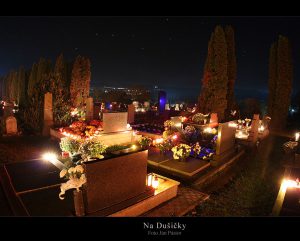November 2: All Souls’ Day
By Tracy A. Burns
 On November 2, designated All Souls’ Day (Dušičky in Czech), Czech’s flock to cemeteries to place flowers and light tea candles at their relatives’ graves. According to the Roman Catholic celebration, by paying homage to their deceased, they help release the souls from Purgatory, where the souls linger, not yet cleansed of minor sins. (When a person dies, the soul is not yet rid of venial sins.) Through these actions, hopefully, the souls will be awarded the vision of God in Heaven. It is also a time to reflect on loved ones who have passed away. The holiday is celebrated by both Czech believers and atheists.
On November 2, designated All Souls’ Day (Dušičky in Czech), Czech’s flock to cemeteries to place flowers and light tea candles at their relatives’ graves. According to the Roman Catholic celebration, by paying homage to their deceased, they help release the souls from Purgatory, where the souls linger, not yet cleansed of minor sins. (When a person dies, the soul is not yet rid of venial sins.) Through these actions, hopefully, the souls will be awarded the vision of God in Heaven. It is also a time to reflect on loved ones who have passed away. The holiday is celebrated by both Czech believers and atheists.
The November 2nd tradition
The tradition of visiting cemeteries on November 2 hails from the 10th century, when, in 998, Abbot Odilo of Cluny, France, made that specific day the official time to pay respects to those who need to be purged of their minor sins. In the beginning, feasts were held in local Benedictine monasteries. Then Carthusians joined in. By the end of the 10th century, though, the tradition had spread throughout the Catholic Church. Thanks to Pope Benedict XV, from 1915 priests have been allowed to celebrate three Masses on this holy day – one focusing on the deceased, another concerning the priest’s intentions, and the third dealing with the intentions of the Holy Father.
Before Abbot Odilo’s decision
But praying for the purification of souls was not always held in November. Before Abbot Odilo’s decision, it was celebrated during the Easter period. In the 10th century, the day of remembrance was moved to October.
Eastern Orthodox Churches
Eastern Orthodox Churches still honor their dead around Pentecost Sunday and have several such holy days throughout the year. For Eastern Orthodox and Eastern Catholic Christians, most All Souls’ Day celebrations take place on Saturdays because that was the day Jesus lay in the Tomb.
Different ways of honoring the deceased
Different countries have different ways of honoring the deceased. While in the Czech Republic the living visit cemeteries, there are also Requiem Masses held in churches. If November 2 falls on a Sunday, the holy day is celebrated on November 3. In the past, in some regions of Italy, children used to leave out food and drink for the dead, believed to return on the vigil of the holiday. In some towns in Italy, people bake cookies called Dead Man’s Bones, which are tasty but hard to chew. In Hungary, on their Day of the Dead, orphans join families and are given food, clothes, and toys. In rural Poland, the tradition is by no means the same. At midnight of All Souls’ Day, the souls take the form of light that shines on churches. Then the souls pray at the altars of their former parishes and visit their homes. Poles leave their doors and windows partially open during this night.
Celebrations of other nationalities
The Philippines’ Memorial Day is similar to All Souls’ Day. After decorating their relatives’ graves, those residing in the Philippines knock on strangers’ doors, asking for gifts as they sing a traditional song. Mexicans honor their dead by taking picnics to the graves, eating candy shaped like skulls, and leaving food on the graves. North America celebrates secular Halloween, instead, of October 31, which is also called The Eve of All Hollows, stemming from the Celtic tradition of a time when the line between death and life becomes blurred.
Ancient Greeks and Romans
Ancient Greeks and Romans used to eat fava beans, a symbol of eternal life because the seeds in the pod are like bodies in a grave, ready to be born again. It seems that Christian traditions were centered on previous beliefs connected to the sowing of next year’s harvest and to the apparent “death” of the seeds in the earth in cold weather.
All Saints’ Day
All Souls’ Day follows the November 1 All Saints’ Day, which originated when, during the ninth century, Byzantine Emperor Leo VI the Wise extended the holiday for martyrs to a celebration for all saints.




